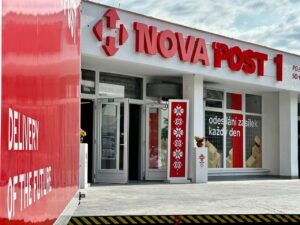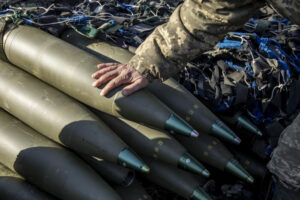
The Czech government is seeking support from other European Union countries for a new ammunition initiative after implementing a similar initiative in 2024, German N-TV reports.
“This is a matter of political will, and if many EU member states rejoin our initiative, we can achieve a lot for Ukraine,” Foreign Minister Jan Lipavsky said in an interview with the German news network (RND).
“We are currently looking at how we can finance the new ammunition initiative, and then we will see how many rounds of ammunition we can get for this money,” the Czech foreign minister added.
As reported, Defense Minister Jana Černohová announced the second project to purchase ammunition for Ukraine under the working title Initiative 2025 back in July last year. Deník N reported at the time that five companies would participate in the project: Czechoslovak Group, STV Group, Omnipol with Ompo Holding, Colt CZ Group SE, owned by Česká zbrojovka, and the DSS arms company.
Under the previous Czech ammunition initiative, Ukraine was provided with approximately half a million pieces of artillery ammunition. A total of 18 countries joined the initiative.

Ukraine has simplified the opening of international bus routes with the Czech Republic, exempting carriers from the need to confirm the presence of a parity partner from a neighboring country, the Ministry of Communities, Territories and Infrastructure (MinRestore) has announced.
According to the report, the period for coordinating the route and issuing a permit will not exceed four months. Communication channels have been established between the countries specifically for the opening of routes.
The relevant changes were agreed upon at a meeting of the joint commission between the Ministry of Reconstruction and the Ministry of Transport of the Czech Republic.
“The growing demand for bus transportation requires the state to ensure an effective process of opening new routes so that the market can quickly respond to passenger demand. The Czech Republic is one of the most popular countries in terms of bus service, so together with our Czech colleagues we have simplified the procedure for opening routes,” Deputy Minister of Community Development, Territories and Infrastructure Serhiy Derkach said in a statement.
He expressed hope that the decision would help improve transport accessibility, increase passenger traffic and help boost business.
The report indicates that the Czech Republic became the first country with which Ukraine ensured full compliance of regular bus routes.
This year, agreements on non-parity passenger transportation were also signed with Slovakia.

Nova Poshta Group has expanded its network of Nova Post offices in the Czech Republic to five cities: after opening in Prague, Brno and Liberec, the company has expanded to Pilsen and Pardubice, its press service reports.
The press release, citing NovaPost CEO in the Czech Republic Andrey Artemenko, said that the next branches of the company will appear in Ostrava, Mladá Boleslav, and České Budějovice.
“We also plan to develop a network of branches within existing businesses, and therefore invite owners of shops, supermarkets, coworking spaces, dry cleaning salons, and others to cooperate,” Artemenko added.
It is specified that Nova Poshta currently has more than 35 thousand points of service for sending and receiving parcels in Europe, of which 90 are Nova Post’s own branches in 13 European countries: Estonia, Poland, Lithuania, Latvia, the Czech Republic, Romania, Germany, Slovakia, Italy, Spain, Hungary, Moldova and the United Kingdom.

The Czech Republic will contribute tens of millions of euros to an initiative it is leading to purchase artillery ammunition for Ukraine, Czech Prime Minister Petr Fiala has said.
According to Reuters, Fiala told CNN’s Prima News on Wednesday evening that the Czech contribution would be over a hundred million kroons, which equates to tens of millions of euros.
“This is roughly the share that a country of our size and prosperity should contribute,” Fiala said.
The Czechs, through a team of government officials and private companies, have requested at least 800,000 pieces of large-caliber ammunition from countries around the world, with the first deliveries to Ukraine expected by June.
But Czech officials have said that this figure is not final and that more ammunition will be delivered if more funding is secured.
The Czech-led initiative has attracted about 18 countries, with Germany pledging the largest contribution so far – €576 million for 180,000 artillery rounds.

Prague has received preliminary approval to purchase an additional 200,000 shells in addition to the mandatory purchase of 300,000 artillery rounds for Ukraine, Czech News reports, citing Prime Minister Petr Fiala.
“…Petr Fiala said that in addition to the mandatory confirmed purchase of 300,000 units of artillery ammunition for Ukraine from third countries, the Czech initiative to search for ammunition has a promise of another 200,000 pieces,” the Czech News website said on Tuesday.
According to Fiala, 18 countries, including Canada, Germany, the Netherlands, and Poland, have joined the Czech initiative to purchase ammunition from third countries. “I consider this a great success. This is yet another proof that the Czech Republic is a full-fledged active player in European security policy,” the Czech Prime Minister said.
Fiala also announced that over the past two years, the Czech Republic has delivered more than a million pieces of large-caliber ammunition to Ukraine.
As reported, at the Munich Security Conference, Czech President Petr Pavel said that the Czech Republic had found up to 800,000 NATO standard-caliber shells that could be sent to Ukraine in a few weeks if funding is found.
Last week, the Czech prime minister said that enough money had been raised to purchase the first batch of 300,000 artillery shells.

The Czech Republic has raised the necessary amount of money to purchase 800,000 pieces of artillery ammunition for Ukraine, which is to be delivered in the coming weeks, Czech News Agency (ČTK) reports, citing Czech President Petr Pavel.
“As of this morning, we have collected the total amount for the purchase of all ammunition, that is, 800,000 pieces,” Pavel told reporters during a visit to the Central Bohemian region.
According to him, the next step will be to sign a memorandum between the Czech government and the 18 countries that have joined the initiative.
“Then, the Czech side will send information to all the supplier countries about the schedule and how we will act,” the Czech president said.
He refused to name the amounts received from individual countries and added that Norway has contributed the required amount.
“Now it all depends on the ability of our companies and the Ministry of Defense to speed up the whole process (of transferring ammunition – IF-U),” Pavel added.
On February 17, it was reported that the Czech Republic is looking for ammunition and weapons to supply Ukraine as soon as possible around the world, in particular, there is a possibility of supplying 500,000 155 mm and 300,000 122 mm shells from third countries within weeks if the necessary funding is received.